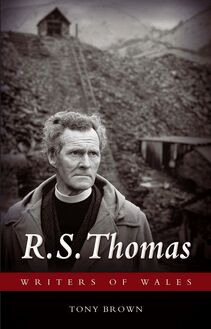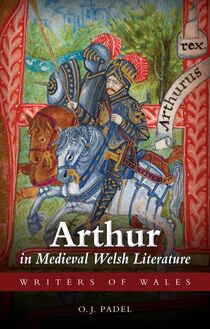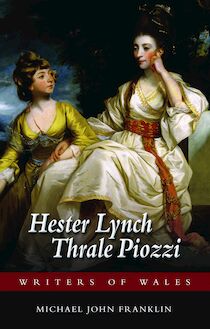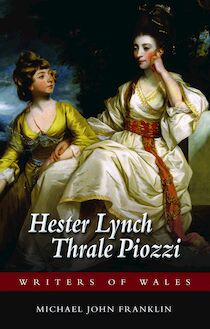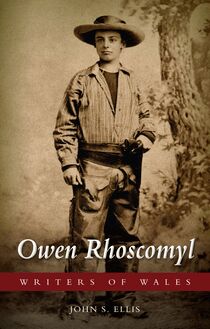Herbert Williams , livre ebook
76
pages
English
Ebooks
2010
Vous pourrez modifier la taille du texte de cet ouvrage
Obtenez un accès à la bibliothèque pour le consulter en ligne En savoir plus
Découvre YouScribe en t'inscrivant gratuitement
Découvre YouScribe en t'inscrivant gratuitement
76
pages
English
Ebooks
2010
Vous pourrez modifier la taille du texte de cet ouvrage
Obtenez un accès à la bibliothèque pour le consulter en ligne En savoir plus
Publié par
Date de parution
01 février 2010
Nombre de lectures
1
EAN13
9781783163991
Langue
English
Herbert Williams is one of Wales' most celebrated and distinguished writers. A man of many talents, he is a poet, novelist, short story writer and historian. This book provides a critical survey of his life and writing.
Publié par
Date de parution
01 février 2010
Nombre de lectures
1
EAN13
9781783163991
Langue
English
Writers of Wales
Herbert Williams
Editors: Meic Stephens Jane Aaron M. Wynn Thomas
Honorary Series Editor: R. Brinley Jones
Other titles in the Writers of Wales series: Rhys Davies (2009), Huw Osborne R. S. Thomas (2006), Tony Brown Ben Bowen (2003), T. Robin Chapman James Kitchener Davies (2002), M. Wynn Thomas Goronwy Rees (2001), John Harris
Writers of Wales
Herbert Williams
Phil Carradice
Phil Carradice, 2010 Cover image: Herbert Williams in 1951
All rights reserved. No part of this book may be reproduced in any material form (including photocopying or storing it in any medium by electronic means and whether or not transiently or incidentally to some other use of this publication) without the written permission of the copyright owner except in accordance with the provisions of the Copyright, Designs and Patents Act 1988. Applications for the copyright owner s written permission to reproduce any part of this publication should be addressed to The University of Wales Press, 10 Columbus Walk, Brigantine Place, Cardiff, CF10 4UP.
www.uwp.co.uk
British Library Cataloguing-in-Publication Data A catalogue record for this book is available from the British Library.
ISBN 978-0-7083-2192-8 e-ISBN 978-1-78316-399-1
The right of Phil Carradice to be identified as author of this work has been asserted by him in accordance with sections 77, 78 and 79 of the Copyright, Designs and Patents Act 1988.
Contents
Acknowledgements
1 A Welsh Childhood
2 The White Death
3 The World of Work
4 A Published Writer
5 BBC Producer
6 Novelist and Editor
7 Cancer
8 Critical Appraisal and the Odd Award
Notes
Bibliography
Acknowledgements
First and foremost, this book could not have been produced without the support and assistance of the man about whom it is written. Herbert Williams has been unstinting in his support, generous with his time and knowledgeable in his opinions and reflections. He has made the project a pleasure. Only marginally behind comes Herbert s wife, Dorothy.
Thanks are also due to John Idris Jones and Robert Nisbet, both of whom willingly gave their opinions about Herbert Williams as a man and as a writer.
Thanks also to the staff of Academi who willingly gave me access to their archives and their back copies of Welsh literary magazines.
Staff at Cardiff Central Library and at the National Library of Wales in Aberystwyth were as helpful and informative as ever.
As always I owe a huge debt to Trudy, my wife, who has yet again put up with the dining room table disappearing under an avalanche of paper and books.
1
A Welsh Childhood
In the winter of 1991-1992, shortly after the untimely death of the actor Ray Smith, Herbert Williams was asked to produce a tribute article for the New Welsh Review . Drawing on both his personal and professional relationship with the man, Herbert Williams commented: Above all he loved words. It s great to have some good words to say, he would remark. 1
It was an astute comment, but Herbert Williams could so easily have been talking about himself. Words have always been important for him - saying them, reading them and, above all, writing them. Searching for the right words, the best words in the best possible order, has been the central focus of his life, firstly as a journalist and, then, as a writer of poetry, biography, history and fiction. Trying to find a voice for ideas, emotions and dreams has been a quest where clarity of thought and ease of expression have remained paramount.
Herbert Williams is an accessible writer. He does not know how to be obscure, would not even know how to begin. To an extent this approach might be due to his long years as a journalist and radio/television producer but it is also due to a deeply-held conviction that a writer s first duty is to communicate, both with himself and with his public. When a critic like Robert Minhinnick, reviewing Herbert Williams s poetry collection Wrestling in Mud states that, most of the sixty plus pieces have a journalistic clarity and, later, complains that the book is a collection of often over-explained poems 2 he misses the point entirely. For Herbert Williams clarity of thought and expression are a virtue. It is the search for clarity that makes the man a writer of consequence. While he writes primarily for himself - something, with self-effacing honesty, to which he readily admits - he also wants and needs others to understand what he is saying. In order for this to happen the search for accessibility is ongoing and essential in everything he writes. He can write with a deliberate and knife-sharp irony, happy to laugh at himself as much as anyone else, but it is the clarity of his phrasing, whether he is writing poetry or prose, that makes his work special.
Herbert Williams remains something of a rarity in Anglo-Welsh writing - Anglo-Welsh being a term he both dislikes and rejects but it was the descriptive phrase in common parlance when he began publishing his poetry and stories in the early 1960s. Despite an early flirtation with the wordy imagery of Dylan Thomas, it was an infatuation that was soon to pass. He has become something of a people s champion, writing poetry that can be understood and appreciated - in head, heart and belly - by anyone with an eye and ear for a well-turned phrase. Not for him the intricate word-play of some poets where the arrangement of the lines and the cleverness of the idea are paramount. As Peter Finch has claimed:
Herbert makes his poetry with a clean, straight measured and accessible line. Clarity, no tricky deviation. If he were English, then he d find kinship with the Movement poets, with Larkin, with Peter Porter, with those whose pastoral tradition goes back through Edward Thomas to Thomas Hardy and beyond. But he s Welsh as is obvious from so much of his subject matter - Aberfan, chapels, Mam, the old Welsh ways and a history that is so different from 1066 and the Wars of the Roses. He s happier in the company of Harri Webb, John Tripp, Sally Roberts Jones, Leslie Norris. They all arrive in the same breath. 3
Over the years, searching has increasingly become a part of Herbert Williams s persona. He has moved insistently and restlessly through life, searching for his place and vocation, for his role, roots and purpose, always knowing that the answer is just around the corner or in the pages of the next book. The need to search, to seek out new situations, has led to an almost gypsy-like quality to his existence, changing jobs on a regular and consistent basis, routinely moving home and up-rooting his family every few years. It is a restlessness that has sometimes led to more than a little pain and discomfort and probably has its roots in an idyllic but, ultimately, traumatic childhood and adolescence.
This restlessness and the need to access new experiences also shows itself in the wide range of work he has produced since his first published efforts in 1961. Although acknowledging that he is, first and foremost, a poet, he has always been fluent in a range of different literary genres. With deceptive ease, he moves from poetry to novels, from biography to history, from short stories and novellas to journalism and reviewing, constantly searching for the perfect form of expression.
Most of what he writes is about human experience, much of it related to Welsh history and to the lives of family and friends. He does not neglect the big themes or issues - love, death, war, and patriotism - but it is the individual experience and individual responses to such imponderables that are crucially important. Even in very early poems the searching theme is evident, even if the search is not always fruitful:
They say this is no place for the ambitious. The young men leave, trailing A pity for the people left behind ( )
Far from the accustomed hills they build The structure of success which they were told Would monument their paragon advance, If only they were bold enough to leave The moment they were old enough to go ( )
But ambitious they are, ambitious to a man, Made ambitious by their education, Prisoners of their nourished talents.
So they display the customary Pity for the people left behind. But their bleak hearts speak The bitter language of the dispossessed. 4
In this poem Herbert Williams s young men are desperately searching for success and, in the traditional Welsh way, feel they have to leave the country of their birth in order to find it. It is a move that Herbert Williams himself made and came to regret several times. Already, in this early work, he displays some of the qualities that will mark his later poetry - the subtle, almost unobtrusive use of repetition ( pity for the people left behind ) and alliteration that slips easily into the sub-consciousness. The final line with its two harrowing words, bitter and dispossessed, deliberately and consciously chosen, underscores the ultimate failure or futility of the search.
Men and women battling against adversity, enduring what life throws at them as they seek their security or survival, are recurring themes in Herbert Williams s work. He is genuinely interested in people, whoever or whatever they are. He has a warm but not uncritical affection for human beings, disliking pretentiousness and affectation, often making them targets for his more sardonic, satirical and ironic verse. His affection for - and interest in - people in general is a theme that runs through all his work. His biographies of individuals like the industrialist David Davies of Llandinam and the writer John Cowper Powys are as powerful as any work of fiction. Even in seemingly austere or esoteric books like Stagecoaches of Wales he manages to fill his text with human interest - it is the drunken coach drivers and their unwitting passengers who catch and hold the imagination of the reader.
In order to understand the significance of searching as a driving force behind Herbert Williams s writing - indeed, to


